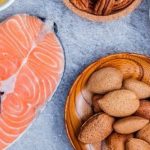Fat doesn’t make you fat. Many nutritious foods out there are high in fat actually. The human body needs fat; it gives us energy, builds cell membranes, helps with blood clotting and muscle movement, reduces inflammation, and helps us absorb some vitamins and minerals. Fats are both “good” and “bad.” Good fats are monounsaturated and polyunsaturated fats, bad fats are man-made trans fats, and saturated fats fall in between.
Dietary fat can actually help people lose weight, because fat can help a person fill fuller for longer, so a person potentially is consuming less calories. When a person eats fat, it also slows the entry of glucose into the blood, which helps moderate sugar levels.
Here is some information about the different kinds of fats:
Monounsaturated Fats – These fats are found in avocados, olive oil, peanut oil, most nuts, canola oil, sunflower oil, and high-oleic oil.
Polyunsaturated Fats – These fats are essential fats, and the body requires them for normal bodily functions; the body can’t produce these fats. Essential fats must be eaten. Polyunsaturated fats can reduce (slightly) LDL cholesterol. Polyunsaturated fats can be found in salmon, herring, sardines, sunflower, safflower, soybean, flaxseed, cottonseed, corn, sesame and, grape-seed oils.
Trans Fats – This type is associated with elevating LDL cholesterol, as well as HDL cholesterol in the blood. T
Saturated Fats – These fats a are found in red meat, whole milk, cheese, and coconut oil. Often baked processed and packaged foods are heavy in saturated (and trans) fat. Too much saturated fat in one’s diet can raise cholesterol (both LDL and HDL). It is recommended that saturated fat is limited to 10 percent of the day’s caloric intake.
Want more control of your diet? Contact Dr. Kordonowy of Internal Medicine, Lipid & Wellness in Fort Myers today. Dr. Kordonowy offers dietary counseling and weight loss strategies. To book an appointment, click here or call 239-362-3005, ext. 200.
